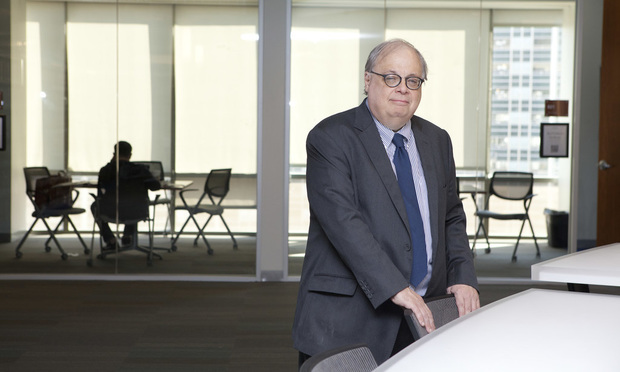Work Matters: How to Turn Bad Advice Into Words to Live By
Why do we listen to bad advice? Because it's simple to understand, easy to digest and inoffensive to hear. All sizzle, no steak, as they say in West Texas. What follows are five pieces of bad advice but with each accompanied by an antidote to neutralize the poison and transform it into something helpful, actionable and meaningful.
November 06, 2019 at 02:33 PM
6 minute read
 Michael P. Maslanka, assistant professor of law, UNT Dallas College of Law.
Michael P. Maslanka, assistant professor of law, UNT Dallas College of Law.
Why do we listen to bad advice? Because it's simple to understand, easy to digest and inoffensive to hear. All sizzle, no steak, as they say in West Texas. What follows are five pieces of bad advice but with each accompanied by an antidote to neutralize the poison and transform it into something helpful, actionable and meaningful.
Bad Advice No. 1: Get out of your comfort zone.
Our culture lauds self-improvement. This piece of bad advice is Exhibit No.1. Here is an illustration: If you don't like to engage in oral argument before a court, or if you are terrified by it, then step behind the podium and have at it and you'll be better for doing so! Chin up!"
No, not really. It's more likely the individual will suffer trauma as opposed to embracing liberation. The Antidote: Take some advice from Anisa Purbasari Norton's "Six Minute Read" column in Fast Company magazine. She writes that going out of one's comfort zone in situations like I just described should be done incrementally, not like a belly flop in a swimming pool (my expression, not hers). So start off by taking a course in effective oral communication in which you get up to speak before others. Or if you want to network more, then do not start off with a noisy and packed event but rather one-on-one meetings. Want to learn more? Read Eric Molinksy's "Reach: A New Strategy To Help You Step Outside Your Comfort Zone, to Rise To Challenges, Build Confidence," a must read for all mentors. And as long as I am recommending books, Marcus Buckingham and David D. Clifton's "Now, Discover Your Strengths," which includes a self-diagnosis test, is a wonderful and liberating book. Their wise counsel: Don't worry about trying to fix what you are bad at, but rather figure out what you are good at and work the dickens out of that. The first brings little return on your investment of time and effort; the second, by contrast, generates abundant rewards. Remember: Do not do what you do not like.
Bad Advice No. 2: Always stand up for your principles and reward will follow.
In his novel, "The Sun Also Rises," Hemingway had a great line, "Isn't it pretty to think so?" If you follow this advice you end up with no job, few friends and zero prospects. Let me tell you a story — a new lawyer went with a senior partner to visit the CEO and GC of a large company that was a firm client. The client was just sued for age discrimination by three former execs. The CEO fumed, "How dare they!" He vowed he would show them, threatening an audit of expense accounts by Arthur Andersen (yes, this was a while ago); searching their garbage at home; and placing tracking devices on their cars, and in this way, we will find out what is going on! The new lawyer started to say, "You can't do that," but a stern look from the GC — usually reserved for unruly children and misbehaving pets (or maybe it's other way around) — silenced him. The GC later gave the new lawyer a life lesson: Remember Pickett's charge at the battle of Gettysburg — brave, noble, heroic — but he only got to do it once. The Antidote: Earn political capital daily, let it grow and compound, and then spend it wisely. When the day comes that you must say "no," you'll be ready.
Bad Advice No. 3: To thy own self be true.
Generations of commencement speakers mindlessly use this line, but here's the entire quote, "This above all: To thine own self be true/ and it must follow/ as the night the day/ thou canst not then be false to any man." This is the fool Polonius to his son who is leaving home. The entire discussion is full of bad advice, as in do not borrow or lend it; of course if followed the economy collapses. Shakespeare is gigging future generations. And this last line, the penultimate one, is the crown because, of course, you must at times be false to others. The Antidote: Follow Vito Corleone's advice and never tell anyone outside the family what you are thinking. Understand artifice is not just OK, but often desirable.
Bad Advice No. 4: Work hard and you'll rise to the top.
Where you end up in your life is a function of many factors outside your control and seldom reliant upon dedication and devotion. In his book, "Life Is Not How Good You Are, It's How Good Do You Want To Be," Paul Arden asks: Why are so many average and mediocre people in positions of authority? Here's the laundry list: chance and circumstance, not causing a fuss, being subservient, and outlasting others by merely sticking around. You get the idea. The Antidote: know that good work must often be its own reward. The key metric is internal fulfillment, not external happiness.
Bad Advice No. 5: Work/Life balance Is doable.
No, it is not, at least for a lawyer. There are times when you must be fully dedicated to the task at hand, whether it's a four-week trial or a month's long deal closing or simply managing a solo practice. It is too exhausting to wedge a balance into the mix. The Antidote: understand that there will be times when a case settles on the day before trial or a matter is postponed and your schedule frees up. If so, take the kids to a ballgame, have a long weekend with the significant other or spend time in a ritzy bar.
Bad Advice No. 6: Relax, your whole life is ahead of you!
Or, now that I am 66, "66 is the new 40." No, this is wrong. Psalm 90 gets it right: "Teach us (O, Lord) how short our time is/ let us know it in the depths of our souls." Life ends. The Antidote: understand that this moment is the only moment you possess and thus the only moment that matters. I learned from my friend and cab driver Gil that in Hindi the word for yesterday and for tomorrow is identical. Why? Today is what counts. And Shakespeare understood this as we see in his greatest work, "Twelfth Night." He writes, "What is love? Tis not hereafter/ Present mirth hath present laughter/ What's to come is still unsure/ In delay there lies no plenty/ Then come kiss me, sweet and twenty/ Youth's a stuff will not endure." Bad advice has a flip side does it not? Live a fulfilling Holiday season. Hope to see you in 2020.
Michael P. Maslanka is an assistant professor of law at UNT Dallas College of Law.
This content has been archived. It is available through our partners, LexisNexis® and Bloomberg Law.
To view this content, please continue to their sites.
Not a Lexis Subscriber?
Subscribe Now
Not a Bloomberg Law Subscriber?
Subscribe Now
NOT FOR REPRINT
© 2025 ALM Global, LLC, All Rights Reserved. Request academic re-use from www.copyright.com. All other uses, submit a request to [email protected]. For more information visit Asset & Logo Licensing.
You Might Like
View All
From Hospital Bed to Legal Insights: Lessons in Life, Law, and Lawyering
6 minute read

Nondisparagement Clauses in Divorce: Balancing Family Harmony and Free Speech
6 minute readTrending Stories
- 1Bar Report - Feb. 10
- 2Morgan Lewis Adds 4 IP Partners in Orange County, 1 in Seattle
- 3Delaware DOJ's Hume Is Named Newest Magistrate In Chancery
- 4Trade Wars: Five Tips for Legal Teams to Manage Tariffs and Trade in Trump II
- 5Balancing Attorney-Client Privilege With a Lawyer’s Right to Defend Against Allegations of Wrongdoing
Who Got The Work
J. Brugh Lower of Gibbons has entered an appearance for industrial equipment supplier Devco Corporation in a pending trademark infringement lawsuit. The suit, accusing the defendant of selling knock-off Graco products, was filed Dec. 18 in New Jersey District Court by Rivkin Radler on behalf of Graco Inc. and Graco Minnesota. The case, assigned to U.S. District Judge Zahid N. Quraishi, is 3:24-cv-11294, Graco Inc. et al v. Devco Corporation.
Who Got The Work
Rebecca Maller-Stein and Kent A. Yalowitz of Arnold & Porter Kaye Scholer have entered their appearances for Hanaco Venture Capital and its executives, Lior Prosor and David Frankel, in a pending securities lawsuit. The action, filed on Dec. 24 in New York Southern District Court by Zell, Aron & Co. on behalf of Goldeneye Advisors, accuses the defendants of negligently and fraudulently managing the plaintiff's $1 million investment. The case, assigned to U.S. District Judge Vernon S. Broderick, is 1:24-cv-09918, Goldeneye Advisors, LLC v. Hanaco Venture Capital, Ltd. et al.
Who Got The Work
Attorneys from A&O Shearman has stepped in as defense counsel for Toronto-Dominion Bank and other defendants in a pending securities class action. The suit, filed Dec. 11 in New York Southern District Court by Bleichmar Fonti & Auld, accuses the defendants of concealing the bank's 'pervasive' deficiencies in regards to its compliance with the Bank Secrecy Act and the quality of its anti-money laundering controls. The case, assigned to U.S. District Judge Arun Subramanian, is 1:24-cv-09445, Gonzalez v. The Toronto-Dominion Bank et al.
Who Got The Work
Crown Castle International, a Pennsylvania company providing shared communications infrastructure, has turned to Luke D. Wolf of Gordon Rees Scully Mansukhani to fend off a pending breach-of-contract lawsuit. The court action, filed Nov. 25 in Michigan Eastern District Court by Hooper Hathaway PC on behalf of The Town Residences LLC, accuses Crown Castle of failing to transfer approximately $30,000 in utility payments from T-Mobile in breach of a roof-top lease and assignment agreement. The case, assigned to U.S. District Judge Susan K. Declercq, is 2:24-cv-13131, The Town Residences LLC v. T-Mobile US, Inc. et al.
Who Got The Work
Wilfred P. Coronato and Daniel M. Schwartz of McCarter & English have stepped in as defense counsel to Electrolux Home Products Inc. in a pending product liability lawsuit. The court action, filed Nov. 26 in New York Eastern District Court by Poulos Lopiccolo PC and Nagel Rice LLP on behalf of David Stern, alleges that the defendant's refrigerators’ drawers and shelving repeatedly break and fall apart within months after purchase. The case, assigned to U.S. District Judge Joan M. Azrack, is 2:24-cv-08204, Stern v. Electrolux Home Products, Inc.
Featured Firms
Law Offices of Gary Martin Hays & Associates, P.C.
(470) 294-1674
Law Offices of Mark E. Salomone
(857) 444-6468
Smith & Hassler
(713) 739-1250







